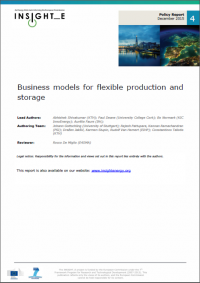Gateway to Think Tanks
| 来源类型 | Publications - External Publications - External Articles |
| 规范类型 | 其他 |
| Business Models for Flexible Production and Storage INSIGHT_E, Policy Report N°4, December 2015 | |
| Aurélie FAURE SCHUYER; , Abhishek SHIVAKUMAR, Paul DEANE, Bo NORMARK, et al. | |
| 发表日期 | 2016-06-08 |
| 出版年 | 2016 |
| 概述 | This report explores business models for storage solutions that may help the European energy system adapt to new challenges. |
| 摘要 |
Business Models for Flexible Production and Storage INSIGHT_E, Policy Report N°4, December 2015
This report explores business models for storage solutions that may help the European energy system adapt to new challenges.  Current trends and policies are progressing in the direction of an increased share of electricity from renewable sources in the EU electricity system, in particular from intermittent sources such as wind and photovoltaics. Furthermore, the share of electricity in total energy consumption is likely to increase in the coming years. Finally, there is increasing use of electric appliances in households at varying use through the day. All together this results in potentially large and sometimes fast variation of both electricity production and consumption - as well as the need to match these - calling for temporary production or storage of electricity or conversion of electricity into other forms in a range of scales for both power and time. The following research questions are the focus for this study: In the light of past and current experiences, the study reviews the need for temporary production and storage (amount of energy, power needed, time scales) in the future, at a time horizon out to 2030 and 2050. This aspect of the report bases its analysis on modelling exercises, and considers the potential solutions to deploying temporary production and storage. Business models and potential evolutions of the legislative framework associated with the different solutions are also proposed. Key learnings from the modelling study: Further studies including how multiple benefits can be used to justify large-scale battery storage may be considered. However, it is likely that such studies would reveal even larger national differences.
Business models for flexible production and storage
|
| 关键词 | Electricity Energy storage Batteries European Union Cyprus Germany |
| URL | https://www.ifri.org/en/publications/publications-ifri/articles-ifri/business-models-flexible-production-and-storage |
| 来源智库 | French Institute of International Relations (France) |
| 资源类型 | 智库出版物 |
| 条目标识符 | http://119.78.100.153/handle/2XGU8XDN/416184 |
| 推荐引用方式 GB/T 7714 | Aurélie FAURE SCHUYER,, Abhishek SHIVAKUMAR, Paul DEANE, Bo NORMARK, et al.. Business Models for Flexible Production and Storage INSIGHT_E, Policy Report N°4, December 2015. 2016. |
| 条目包含的文件 | ||||||
| 文件名称/大小 | 资源类型 | 版本类型 | 开放类型 | 使用许可 | ||
| insight_policy_repor(36KB) | 智库出版物 | 限制开放 | CC BY-NC-SA |  浏览 | ||
| insight_faure_storag(1842KB) | 智库出版物 | 限制开放 | CC BY-NC-SA | 浏览 | ||
除非特别说明,本系统中所有内容都受版权保护,并保留所有权利。